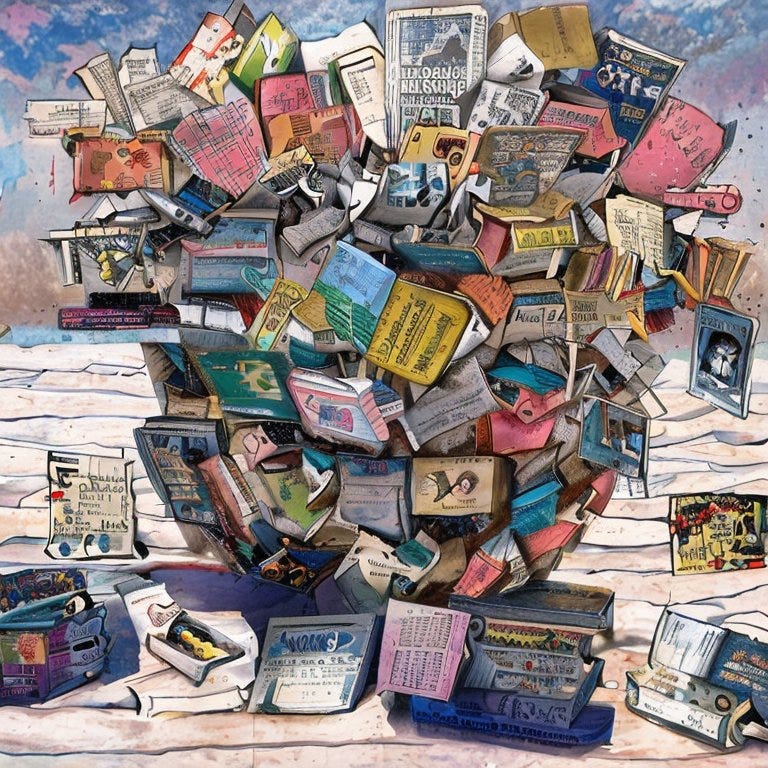Authors don't use AI to Lie, Deceive & Manipulate
Just stir some Svengali into that Cauldron of Convincing
Just Go With The Flow
Sit with your palms resting in your lap Push your seat back Close your eyes Breathe in… and out... In… and out… Empty your mind Relax Let your thoughts flow out Now open your eyes And let my words flow in
The writer’s thoughts flowed through their mind in rivulets of ideas and snatches of conversation. Some were unconfessed reality, but most were imagined. Using hidden and mysterious neuronal weights and levers, the perceived finest were selected for surfacing into conscious appreciation; to be captured and moulded into a common language, one the writer had learnt on their parent’s knee or from subtitled TVs.
The writer was compelled to reconstruct these imagined thoughts inside another person's head. The wielded words had to manipulate another’s mind, to willingly suspend their belief and deceive their perception of grounded truth. The shame of failing in this task was equalled only by a blight of invisibility. False prophets had burnt for less. People might cry out with joy or sadness at their success. Trees would die in servitude to this task.
These words had existed before, but not with the writer’s attached feelings, nor in this order – they hoped. They had to be clear, concise and crisp in their communication. The medium they used demanded it. Others would sit in judgement on it. The words were, in turn, only composed of less than thirty symbols, warped and consolidated over centuries, across geography and culture, through wars and plague. The mutations impacting them continued unchecked, subject to laws transcending human control.
There was a digital divide, of course. The symbols transmuted by keys into tiny bits, nanometres of fizzing electrons jumping in and out of controlled states of excitement. The photons employed for their transmission were different: dedicated, direct and determined. Each of them painlessly carried a carefully copied mote of the words willingly released by the writer's mind.
Reconstitution for their reader was the easier part. Their brain was receptive, trained and easily swayed into matching the writer’s thoughts with their own prior knowledge and experience. It eagerly snatched the symbols and pulled them in for real-time processing. Language subconsciously turned into projected images for the gratification of the devilish homunculus crouched inside their head – or so they imagined. But it remained a messy business, prone to both errors in transcription and translation, then misinterpretation. Even subject to argument – both within and without. Yet the hallucinations still took on a life of their own, blossoming into the fantasy which the reader craved to be theirs alone. An individualised experience which they might carry in their heart and mind for decades hence.
The writer didn’t hide their lies. They shared the open secret with their readers, who understood, enjoyed their mutual connivance, even celebrated and encouraged it. The words they read described things which had never happened, perhaps never could. But it didn't stop them from wishing they would. For life was far duller without the writer's words.
Perhaps one day they would write their own unique words, using the language of a million others, sharing a secret with millions more; completing the never-ending circle of deliberate human deceit.
Please return your seatbacks to upright and your brain to normality.
I hope you enjoyed that little hallucinatory experience. Your brain is this universe’s best known hallucination-generating machine, one which constantly cross-checks perceived reality with its internally constructed models of the world around you. Next time you’re getting ready for bed in the house where you usually live, switch out all the lights and carry on. Then, as you lie in your bed, think of all that electricity you could save…
Some snippets:
From the query trenches…
This week I’ve been carefully choosing words intended to generate hallucinations inside the brains of selected literary agents. Otherwise known as ‘query letters’ they are written to convince one person that they can convince a group of other people to convince thousands of other people to buy my novel.
This is a tough task. Publishing is essentially a casino of gambled hope. I currently think that the best mental approach is to set high expectations for what you write and a low bar on the money you'll make.
Never forget the emotional, financial and critical support of those close to you. Without them I wouldn't be here.
I’ve been wondering if the YA spicy romantasy trend isn’t just a modern take on teenagers sneaking a peek at a newsagent’s top shelf? Could its more commercially-oriented creators be merely riding (or chasing) a wave of sanitised smut? The tick is tocking on this one.
Are the algorithms taking over by consent?
Have we been duped by our own powers of imagination and persuasion into becoming the consumptive capitalist slaves of emotionless, animated algorithms? Does it matter? We enjoy letting our senses being subsumed, to hide under the covers as our most trusted relative pretends to be the monster hiding in the hills or under our bed. Even as adults, we still try to develop and derive newly delicious, dangerous and addictive thrills. No, I don’t think it does matter. But only because we can’t or won’t do anything to stop it. Not until it’s too late.
My most recent accolade!
My recent short story ‘You Go First’ was given an ‘honourable mention’ (equivalent to a 2nd= placing) in Season 4 of the Lunar Awards. This level of peer and reader recognition provides a welcome spur to what can sometimes be an arduous journey.
You Go First
This is my short story entry to the opening Lunar Awards season of 2024. Thank you to Brian Reindel 👾⚔️ for hosting these showcases. The story’s premise is based on the fourth possibility I outlined in the prior week’s post.
That’s all, folks!1
JR
But do look out for my poetic Valentine’s Day treat: a wayward tale of treachery, lust and revenge!





